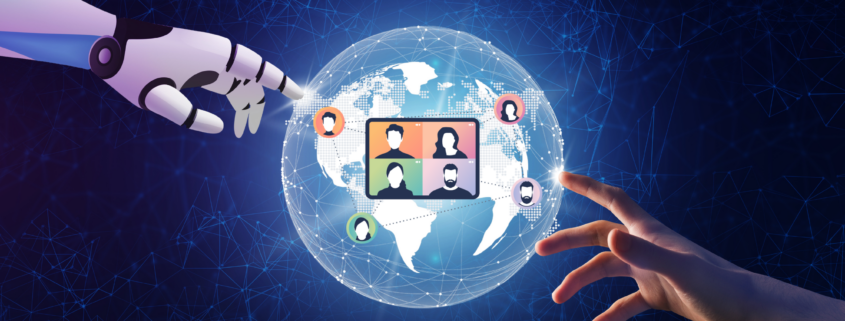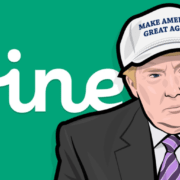How AI is Changing Social Media
Harnessing the power of AI has become essential for marketers looking to optimize their social media content and campaigns. AI seamlessly integrates into major social media platforms, revolutionizing marketing strategies and driving unparalleled results.
According to The 2023 State of Social Media Report, 97% of business leaders recognize AI’s role in optimizing social media data and insights. This blog will explore the dynamic intersection of social media and AI, offering insights and practical tips to elevate your current marketing approach. Join us as we explore the potential of AI in social media and unlock new opportunities for brand growth and engagement.
What is AI in Social Media?
AI in social media marketing uses machine learning and natural language processing to dissect user data and interactions across social platforms. This empowers marketers to leverage AI tools for tasks such as:
- Personalization.
- Content creation.
- Influencer marketing.
- Customer service.
- Advertising.
Such integration promotes data-driven decision-making, helping shape social media strategies. The promise of AI in digital marketing is achieving hyper-personalization to deliver tailored experiences that resonate with individual preferences and needs. Let’s look at each task in more detail and how it can change your marketing strategy.
Content Creation
In the digital landscape, content creation is the bedrock of success. It’s essential for any business or brand striving to leave its mark online. Thanks to AI-powered tools, generating high-quality content has become swift and efficient. Whether crafting catchy captions, composing compelling blog posts, or producing captivating videos, AI algorithms can mimic human creativity and language patterns.
Natural Language Processing (NLP) algorithms and platforms can now analyze user preferences, trending topics, and historical data with precision. This enables the tailoring of content that resonates deeply with target audiences. However, it’s important to acknowledge that while these language models can swiftly produce information, accuracy and relevance may vary, and there’s always a risk of outdated content. It’s always crucial to check the source to avoid this problem.
Influencer Marketing
In the era before social media, brands relied heavily on traditional marketing channels such as print ads and TV commercials. These campaigns often featured iconic characters like Santa Claus for Coca-Cola, aiming to forge emotional connections with consumers. However, with the advent of social media, marketing strategies underwent a natural evolution. Rather than depending solely on fictional characters or celebrity endorsements, brands now tap into the influence of real-life individuals on social media platforms.
Just as consumers once trusted the endorsements of these beloved characters, the authentic recommendations of social media influencers sway today’s audiences. This shift has propelled influencer marketing to the forefront of social media strategies, with brands leveraging popular personalities to promote their products and services. AI algorithms are key in helping analyze an influencer’s reach, engagement, and audience demographics to identify the right fit for specific campaigns.
Furthermore, AI-powered platforms can help predict trends and measure influencer collaborations’ effectiveness, helping brands maximize ROI. This data-driven approach enhances the impact of influencer marketing efforts and optimizes resource allocation for future campaigns.
Personalization
Personalization helps increase user engagement, build loyalty, and improve return on investment. When content resonates personally, users are more likely to engage. Engagement takes shape in the form of clicks, shares, or conversions. A brand that shows it understands its audience establishes trust. Over time, this trust translates into loyalty. Personalized campaigns often see a better return on investment because they target the right people with the right message.
AI algorithms analyze user behavior on social media platforms. This includes the types of posts they engage with, the frequency of their interactions, and the time of day they are most active. AI can suggest personalized content that aligns with the user’s interests and preferences based on this data. For example, if a user frequently interacts with fashion-related content, AI may recommend fashion blogs, influencer posts, or advertisements for clothing brands.
Customer Service
AI-powered chatbots have revolutionized customer service on social media platforms. These chatbots can decipher and adapt to individual user preferences and behaviors. They achieve this using sophisticated algorithms. Chatbots help ensure that each interaction feels unique and catered to the user. Instead of generic responses or predefined scripts, customers are treated to a conversation that mirrors their interests and needs.
This hyper-personalized touch helps enhance the user experience and fosters a deeper connection between the consumer and the brand. When customers feel understood and valued in this manner, it naturally elevates their loyalty to the brand. Over time, this strengthened bond translates into increased sales, as consumers are more inclined to purchase from brands they resonate with and trust.
Advertising
Social media advertising brings many benefits to businesses. Firstly, it can increase a brand’s visibility and recognition. Your brand gets exposed to a diverse audience, fostering recognition and recall. Moreover, social media platforms foster improved customer engagement and loyalty. The conversational nature of social media platforms provides a unique opportunity for brands to build meaningful relationships with their customers.
AI is quickly changing the social media advertising landscape by helping enable brands to target audiences with unprecedented precision and efficiency. Machine learning algorithms analyze user data and behavioral patterns to help optimize real-time ad targeting. By leveraging predictive analytics and A/B testing, advertisers can refine their campaigns and achieve higher ROI. AI-powered ad platforms also offer sophisticated ad formats, such as dynamic product ads and personalized recommendations, to deliver highly relevant and engaging content to users.
Last Thoughts
AI is revolutionizing social media by empowering platforms and brands to enhance their marketing and advertising strategies. As AI continues to evolve, the possibilities for innovation and growth in social media are virtually limitless. As we enter this new era, brands and marketers must be agile and innovative and prioritize the end-user’s experience.
At Onimod Global, we’re excited about the endless possibilities that the future of digital marketing holds. If you want to harness the power of new digital marketing trends for your brand, contact us today.










